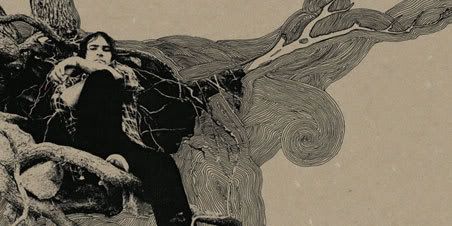
“Here We Are“
from the album Everyone’s in Everyone
2007
iTunes
Songwriter Patrick Park never saw a single episode of the soapy show “The O.C.” before the series ended earlier this year. (The singer hasn’t owned a television set in nearly a decade.)
So how did Park’s “Life is a Song” end up landing the sweet spot as the series’ final musical number?
“The music supervisors just heard the song on my Myspace page and left a message,” Park says. “That was pretty cool. Usually, all I get on there is spam for Viagra.”
So far, the exposure hasn’t resulted in the kind of “O.C.”-driven boost that helped break bands like Death Cab for Cutie. But it deserves to. Operating under the radar, Park has written some of the most lyrically astute, and sonically sensitive, songs by a solo artist today. His debut CD, 2003’s Loneliness Knows My Name, threatened to give old-fashioned singer-songwriters a good name, providing a modern answer to early Jackson Browne.
This month Park issued his second CD, Everyone’s in Everyone, which kicks off with “Life is a Song.” The number epitomizes the album’s main motif.
Here, and throughout the disk, Park ruminates on how our assumptions about ourselves doom us to repeat bad behavior and bar us from change. “It’s time to let go of everything we used to know/ ideas of strength and who we’ve been,” he sings. “It’s time to cut ties that won’t ever free our minds/from the chains and shackles that they’re in.”
“Certain things happen to us in our lives and we identify those things as being part of us,” Park explains. “But once they’re gone there’s no reality to them anymore. The past is a figment of our imagination. If you hold on to it too strongly, you can’t see what’s really around you.”
That struggle came to obsess Park between his first and second CD. After his debut ran its course, he says he was “a complete mess.”
While declining to go into specifics, Park offers: “There are a million ways to self-destruct and I feel like I’ve found a lot of those — whether that be sabotaging relationships, personal and professional, or substance abuse — trying to get away from whatever feeling I haven’t been able to deal with.”
The struggle to confront those emotions defines much of the new CD. Lyrically, Park does so in an uncommonly clear way. Unlike many pop scribes, who seem hell-bent on making their words as inaccessible as possible, Park pens vivid verse that’s poetic, too. “The trick is to be clear without being too literal,” he says. “I want people to know what I’m getting at.”
Park learned some of that from his mother, a poet. “She taught me that there are a lot of ways to say something. You can make it more powerful by turning it on its head.”
Park has written songs since he was an early teen growing up in Morrison, Colo. “The place was out of the way of a lot of things,” he says. “So I didn’t have a lot of outside influences.”
His father, a doctor, played American folk and blues records around the house, which made a deep impression on Park. While he played in bands as a teenager, the singer says he never collaborated much with the other members. “I don’t how much fun I was to play in a band with,” he laughs. “I just wrote the songs on my own and then would take them to the other members.”
In 1998, Park moved to New York to try to make it. But he lasted less than eight months. “[The city] pretty much kicked my ass,” he says. “I was really young and didn’t know anybody.”
The singer retreated to Los Angeles, which felt a little more like Colorado. There he took jobs as a waiter, retail clerk and karate teacher (he’s a black belt, incongruously enough). At the same time, Park self-produced a CD called The Basement Tapes, which he sent to producer David Trumfio (Wilco, OK Go). He’d met Trumfio some time earlier in Denver. Impressed by the music, the producer cut an EP with Park, which led to a contract with Hollywood Records and his Loneliness debut.
The CD’s title reflected the end of a bad relationship, as well as the death of Park’s father (who’d been sickly for years). While the CD got great reviews, it didn’t sell. Park became disillusioned with the company. “They had no idea what to do with me,” he says. “They’re a pop label, so they were always trying to fit a square peg in a round hole.”
The new CD appears on the indie imprint Curb Appeal. While it continues the melancholy mood of the first, the music has a more spare beauty and its lyrics show a new precision.
Park’s lyrical questioning of assumptions has more than a psychological resonance. There’s a political angle too. Many of the songs muse on the rigid ideologies that led us to the Iraq war. “So many problems in the world have to do with us acting like there’s truth in things that are really only opinions,” he says.
Of course, it’s threatening to question those things — especially on a personal level. But to Park it’s necessary. “Sometimes the hardest thing to do is to admit you’re not the person you always thought you were,” he says. “But in the end, that’s the only honest place change can come from.”


